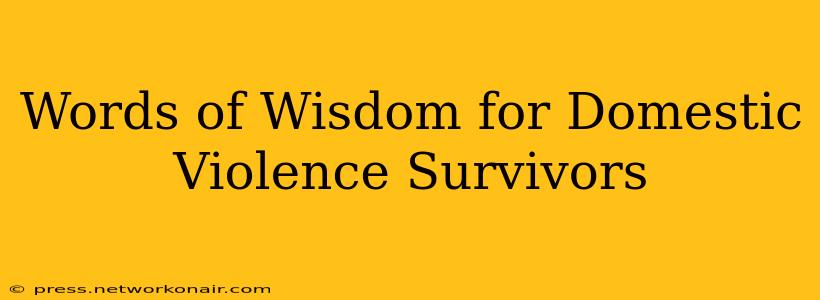Domestic violence is a devastating experience, leaving survivors with emotional scars and a daunting path to recovery. This article offers words of wisdom and practical advice for those navigating this challenging journey. It's important to remember that healing takes time, and you are not alone. There are resources and support systems available to help you reclaim your life and build a brighter future.
What are the first steps I should take if I am experiencing domestic violence?
The first step is acknowledging that you are in a dangerous situation and that you deserve to be safe. This can be incredibly difficult, as abusers often manipulate and gaslight their victims. Prioritizing your safety is paramount. This might involve:
- Creating a safety plan: This plan should include identifying safe places to go (a friend's house, a family member's home, a domestic violence shelter), pre-packing a bag with essential items, and having a pre-arranged signal with a trusted friend or family member to indicate you need help.
- Reaching out for help: Contact a domestic violence hotline, a trusted friend or family member, or the police. Many organizations offer confidential support and resources.
- Documenting the abuse: Keeping a record of incidents, including dates, times, and details of the abuse, can be crucial if you decide to pursue legal action. This documentation can include photos, videos, or written accounts.
How do I cope with the emotional trauma of domestic violence?
Emotional trauma is a significant consequence of domestic violence. It's essential to address these issues with professional help. Effective coping mechanisms include:
- Seeking therapy: A therapist specializing in trauma can provide a safe space to process your emotions, develop coping strategies, and work through the lasting effects of abuse.
- Joining a support group: Connecting with other survivors can be incredibly powerful. Sharing experiences and finding common ground can reduce feelings of isolation and shame.
- Practicing self-care: Prioritizing your physical and mental well-being is crucial. This might include engaging in activities you enjoy, eating healthy foods, exercising, getting enough sleep, and practicing mindfulness or meditation.
How can I protect myself from further abuse?
Protecting yourself from further abuse requires a multi-faceted approach:
- Establishing boundaries: Learning to set and maintain healthy boundaries is essential. This includes saying "no" to unwanted requests, asserting your needs, and refusing to tolerate abusive behavior.
- Seeking legal protection: Obtaining a restraining order can provide legal protection and prevent the abuser from contacting you or coming near you.
- Building a support network: Surrounding yourself with trusted friends, family, and professionals can provide a crucial safety net and emotional support.
What resources are available to help domestic violence survivors?
Numerous resources are available to support survivors of domestic violence. These include:
- National Domestic Violence Hotline: This hotline provides confidential support, crisis intervention, and referrals to local resources.
- Local domestic violence shelters: These shelters offer safe housing, support services, and advocacy for survivors.
- Legal aid organizations: These organizations can provide legal assistance to survivors seeking protection orders or pursuing legal action against their abusers.
How long does it take to recover from domestic violence?
Recovery from domestic violence is a deeply personal journey, and there's no set timeline. Healing is not linear; it involves ups and downs. Be patient with yourself, and celebrate small victories along the way. Remember that seeking professional help is a sign of strength, not weakness. It’s crucial to remember that you deserve safety, respect, and happiness.
Where can I find more information and support?
For more information and support, you can search online for domestic violence resources in your area or contact your local police department or social services agency. Remember, you are not alone, and help is available. Your safety and well-being are paramount.
Author Note: This information is for educational purposes only and should not be considered a substitute for professional advice. If you are experiencing domestic violence, please seek help immediately.

